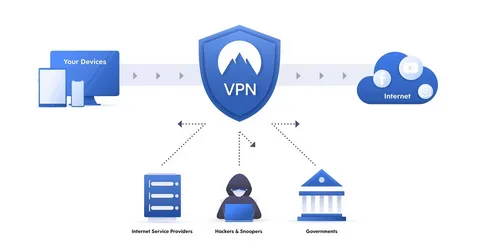As digital privacy concerns continue to rise and cyber threats become more sophisticated, VPN (Virtual Private Network) technology is expected to evolve significantly in the coming years. Here are some key trends and advancements that users and businesses can anticipate in the VPN landscape:
1. Enhanced Security Protocols
- Adoption of Advanced Encryption: VPN technology providers will increasingly implement advanced encryption standards, such as AES-256, and explore post-quantum encryption to safeguard user data against emerging threats.
- Zero-Trust Security Models: The zero-trust approach, which assumes that threats can come from both inside and outside the network, will be integrated into VPN architectures, enhancing security by requiring continuous verification of user identity and device status.
2. AI and Machine Learning Integration
- Smart Threat Detection: AI and machine learning algorithms will be used to monitor and analyze traffic patterns, allowing VPNs to detect and respond to potential security threats in real-time, enhancing overall network security.
- Optimized User Experience: AI can help optimize server selection and connection speeds, providing users with a seamless experience while using VPN services.
3. Decentralized VPNs (dVPNs)
- Increased Privacy and Censorship Resistance: Decentralized VPNs will gain popularity as they distribute control across a network of nodes, enhancing user privacy and making it harder for authorities to impose censorship.
- Community-Driven Models: dVPNs may rely on community contributions, allowing users to share their bandwidth and resources, creating a more resilient and robust network.
4. Improved User Experience and Accessibility
- Simplified Interfaces: As VPNs become more mainstream, user interfaces will continue to evolve to be more intuitive, making it easier for non-technical users to understand and utilize VPN services effectively.
- Automated Connections: VPNs may automatically connect users when they access unsecured networks, such as public Wi-Fi, ensuring continuous protection without requiring manual activation.
5. Integration with IoT and Smart Devices
- Enhanced IoT Security: With the proliferation of Internet of Things (IoT) devices, VPNs will need to provide tailored solutions for securing these devices, potentially offering lightweight protocols optimized for low-power consumption.
- Network-Wide Protection: VPNs may be integrated into home routers, providing comprehensive security for all connected devices within a network without the need for individual installations.
6. Greater Focus on Privacy Compliance
- Alignment with Regulations: VPN providers will increasingly prioritize compliance with data protection regulations, such as GDPR and CCPA, ensuring that their practices align with legal requirements and users’ privacy rights.
- Transparent Data Practices: Users will demand more transparency regarding data logging and sharing practices, leading VPN providers to adopt clear and user-friendly privacy policies.
7. Expanded Multi-Platform Support
- Seamless Cross-Device Functionality: VPN services will focus on providing seamless experiences across various platforms, including desktops, smartphones, tablets, and smart TVs, ensuring users have consistent security regardless of the device they use.
- Unified Protection Across Networks: Users will expect VPNs to protect them across all types of networks, whether at home, in the office, or on public Wi-Fi.
8. Integration with Other Security Solutions
- Multi-Layered Security Approaches: VPNs will increasingly be integrated with other security solutions, such as firewalls, antivirus software, and intrusion detection systems, creating a more comprehensive security ecosystem.
- Collaboration with Threat Intelligence Services: VPN providers may collaborate with cybersecurity firms to leverage threat intelligence, enhancing their ability to protect users from known vulnerabilities and attacks.
9. Focus on Performance and Speed
- Enhanced Server Networks: VPN providers will expand their server networks globally to improve connection speeds and reduce latency, ensuring users experience minimal slowdowns while connected.
- Adoption of Next-Gen Protocols: New protocols, such as WireGuard, will gain traction for their ability to provide faster and more secure connections compared to traditional protocols like OpenVPN and IPSec.
10. Educational Initiatives for Users
- Raising Awareness: VPN providers will invest in educational initiatives to help users understand the importance of online privacy and security, guiding them on how to use VPNs effectively to protect their data.
- Workshops and Resources: Online resources, webinars, and workshops will be offered to help users stay informed about the latest trends in cybersecurity and the role of VPNs in safeguarding their online activities.
Conclusion
The future of VPN technology is poised for significant advancements that will enhance online security, privacy, and user experience. As users become more aware of the importance of digital privacy, VPN providers will need to adapt and innovate to meet their needs. By embracing new technologies, improving security measures, and fostering transparency, the VPN industry will play a crucial role in shaping a safer digital landscape in the years to come.
















